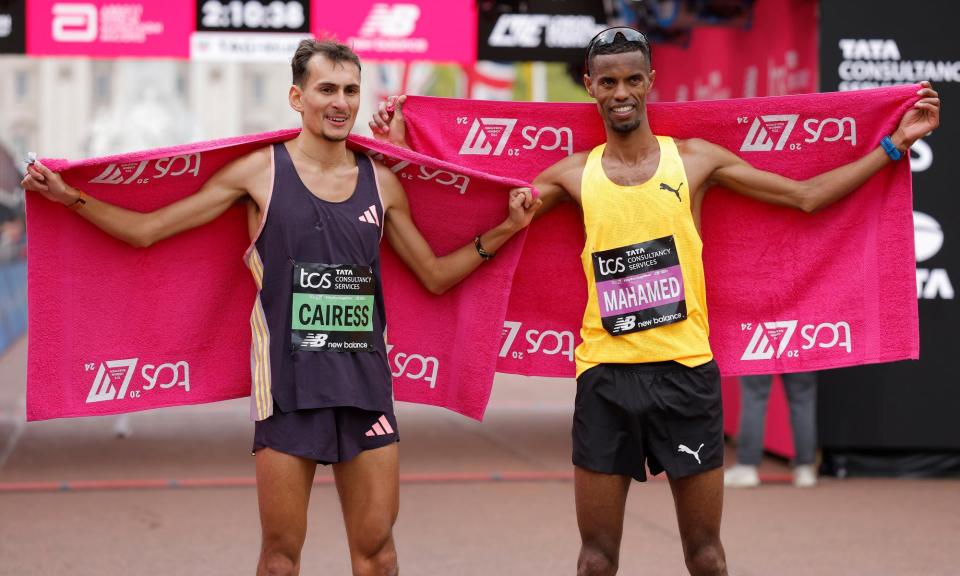Britain’s Emile Cairess finishes third at London Marathon to book Olympic spot

As Emile Cairess entered the final 200 metres of the London Marathon, the wall of sound from spectators was suddenly interrupted by an excited bark from the PA. “And there’s our third placed finisher coming into view!” Which, as the quiet man of British athletics later admitted, came as rather a nice surprise.
But it was all the 26-year-old deserved for a performance of soul and substance, particularly in the final two miles, where he weaved past tired legs to leap from eighth to the podium and book his place at the Paris Olympics.
Related: Peres Jepchirchir beats women’s-only world record to win London Marathon
And, as Cairess revealed afterwards, it came despite his training being deeply affected by a recent car crash that left his cousin in a coma for over a month.
On a day where the Kenyan Alexander Mutiso Munyao was the unexpected winner of the men’s race in 2 mins 04 hr 01 sec, and the Ethiopian legend Kenenisa Bekele rolled back the years to finish 14 seconds back in second, British eyes became steadily more drawn to Cairess, as he whittled off successive stragglers to finish in a personal best of 2:06:46.
He had wanted to go much quicker. One day, in less gusty conditions, he surely will. But it was still the second fastest time ever by a Briton, only behind Mo Farah, which was even more impressive given his state of mind beforehand.
“My cousin Oliver Burton was in a bad car crash recently and he was in a coma for about a month,” he explained. “He’s 22 but he’s like a little brother to me. He’s just come out of the ICU a few days ago. It was so stressful, touch and go at some points, so it’s been tough.
“This morning I was really emotional,” he added. “I’ve not experienced anything like that before and I hope not to experience anything like it in the future.”
Cairess went through halfway about a minute behind the leading pack, but it was always part of his strategy to start steadily and close strongly. But he didn’t realise how strongly he was going until near the end.
“I didn’t know I was in third until the announcer on the PA said it with 200m to go,” he explained. “But I had passed a few people so I thought there couldn’t be too many further up the road.”
The only disappointment was that the gusty conditions stopped him achieving his goal of running 2:05. “Some sections were all right,” he said. “But you would go around a corner and you’d get pushed back and have to really fight it. I was happy how I dealt with the wind - because I dislike running in it quite a lot!”
Another Briton, Mahamed Mahamed, also made a late charge to come fourth in 2:07:05 and book his place for Paris. His time was particularly impressive given much of his training had come while observing Ramadan. “Ramadan changed everything about my routine: training, sleeping and nutrition,” he explained.
“I would train before the sunset, and if I was doing another session I would do it at almost midnight. I would get up at 4am to eat before training. And in the evening then I would eat at 7pm, rest for a bit, and go for a run.”
For a large part of the race it had looked like Bekele, a three-time Olympic gold medallist who has won 17 world titles over cross-country, track and road, was about to win his first London Marathon at the age of 41.
However the legendary Ethiopian had no answer to Munyao when he pushed clear with just over a mile to go. “At 40km I felt some pressure from Bekele but I had trained for this race, so I said: let me be confident and I had enough energy to win,” said Munyao. “That’s why I kicked.”

 Yahoo Sport
Yahoo Sport 





































